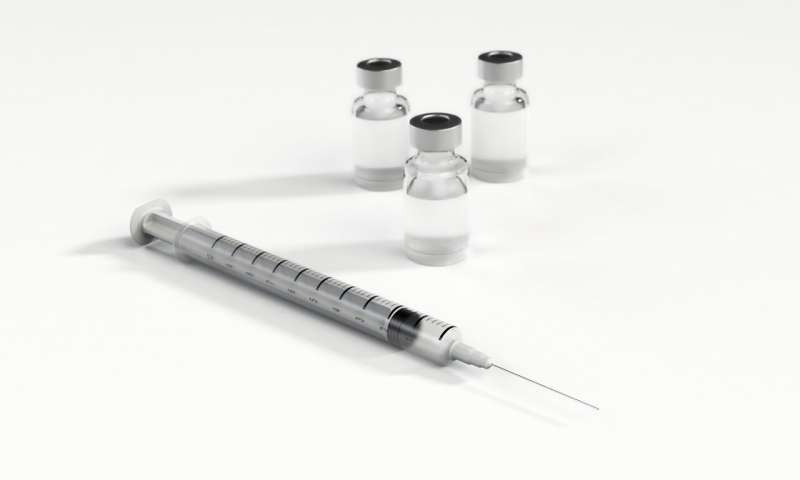Credit: Pixabay/CC0 Public Domain
Q: My daughter is about to turn 12. Which COVID-19 vaccine should she get?
A: The short answer: Your child should get the vaccine product that is recommended for their age.
Right now, the only COVID-19 vaccine available for children in the U.S. is the Pfizer BioNTech mRNA vaccine. COVID-19 vaccination is recommended for children 5 years and older. The COVID shot for kids 5 years to 11 years of age is a lower dose than the dose recommended for those 12 and older.
The Food and Drug Administration authorized the Pfizer vaccine for 5- to 11-year-olds. The Centers for Disease Control and Prevention then recommended the vaccine for this age group.
You may wonder why it's important to get the lower dose for younger kids. The reason is the COVID-19 vaccine for children ages 5 to 11 was tested at the lower dose. This lower dose is what has been authorized and recommended.
Here are the doses of the Pfizer BioNTech mRNA vaccine, by age:
— 12 through 17 years: 30-microgram COVID-19 vaccine, two separate doses, given 21 days apart.
— 5 through 11 years: 10-microgram COVID-19 vaccine, two separate doses, given 21 days apart.
— Under 5 years: A COVID-19 vaccine is not yet available and the doses have not been determined.
Your child's doctor only can use the lower dose when they give the vaccine to 5- to 11-year-olds. The main reason is to make sure your child gets exactly the amount they need. The safest way for doctors to give your child the lower dose is to use the vials that are being specifically designed for younger children.
You may wonder why this dosing isn't based on your child's weight. Vaccines don't work the same way that medicines such as antibiotics do. Antibiotics help your body get rid of germs when you are sick. And to get rid of germs, your body needs the right amount of medicine so it can make it to all parts of the body and find the problem. We dose antibiotics by weight so the medicine can get to all the places of infection at levels needed by different size bodies.
A vaccine, on the other hand, helps your body know how to stop germs before they make you sick. Just a very small dose is all your cells need to learn how to stop germs. Cells in your immune system go to the spot where the vaccine is given, rather than the vaccine needing to get all around the body. With information provided by the vaccine, the immune cells then launch a response to get rid of the virus. The COVID-19 vaccine clinical trial had more than 2,000 children. Researchers studied how well the vaccine worked in 5- to 11-year-olds. They also looked at data on how well the vaccine worked in 16- to 55-year-olds. The results? Children had the same immune response from the smaller dose and fewer minor side effects.
After a shot, your child might have mild symptoms as the immune system practices what it has learned and how to avoid getting sick. The next time your child is in contact with that virus, the immune system will know how to stop your child from getting sick.
Children younger than 5 are not yet eligible for the vaccine, but children ages 6 months to 4 years are being closely studied. I'm eager to see the youngest children get vaccinated, as are many parents.
Soon, vaccine safety experts may talk about a COVID-19 vaccine dose for these young children. For now, all the ways we protect children from getting sick from COVID-19 are important. That includes getting the vaccine if you are old enough, especially if you interact with younger children. Mothers can help protect babies when they get the vaccine before or during pregnancy and by breastfeeding. Your child's doctor can answer questions about the vaccine. It's safe, and it works. It also is the best tool we have so we can stop the spread of the virus and protect your child from COVID-19.
Provided by Mayo Clinic
























